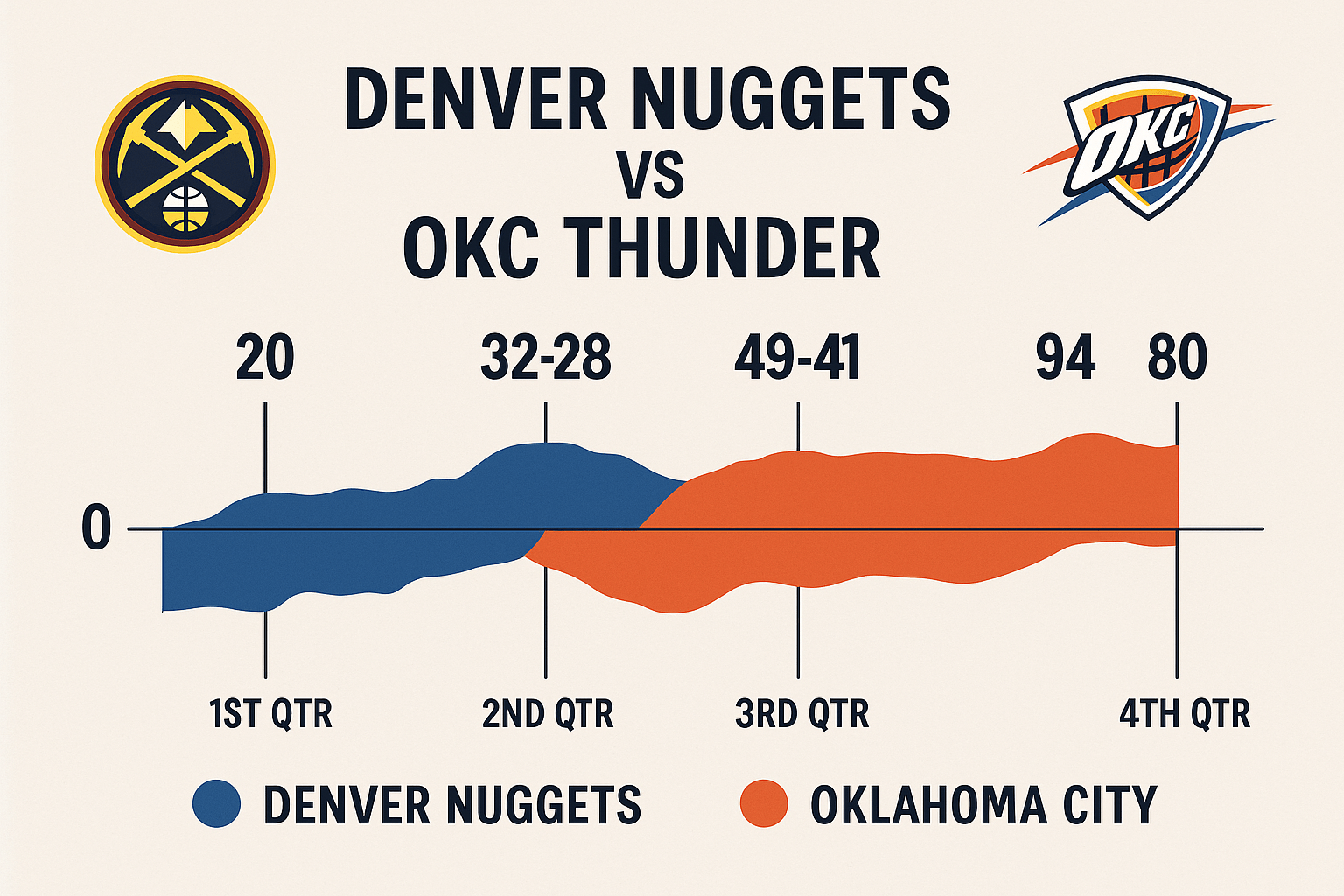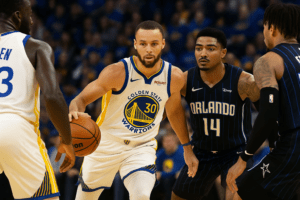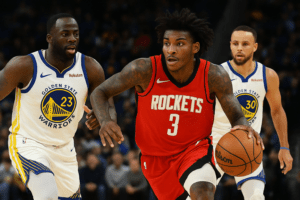The NBA is known for its marquee rivalries—Lakers vs Celtics, Bulls vs Pistons—but there are others that don’t grab national headlines yet simmer with intensity and grit. One such story is the Denver Nuggets vs OKC Thunder timeline—a rivalry forged not in spotlight, but in fire. It’s a matchup that’s never needed hype to deliver moments. It just shows up, year after year, game after game, and reminds us how deep competition can run when pride is on the line.
It’s not flashy, but it’s fierce. And that’s exactly why it deserves a closer look.
Early Days: Quiet Beginnings, Unspoken Tension
The roots of the Denver Nuggets vs OKC Thunder timeline begin in the late 2000s, when the Seattle SuperSonics relocated and rebranded as the Oklahoma City Thunder. For the first few years, matchups between these two were forgettable. The Nuggets had Carmelo Anthony at the helm, while OKC was still forming its young core: Kevin Durant, Russell Westbrook, and James Harden.
But as both teams found footing in the Western Conference, a shift began to take place. Denver’s run-and-gun offense clashed headfirst with OKC’s youthful explosiveness. The battles were physical. The outcomes unpredictable.
A 2011 game stands out—not for its outcome, but its tone. Durant dropped 44, but the Nuggets refused to back down, trading buckets through Arron Afflalo and Nene. It wasn’t just another win or loss. It felt like two teams learning how to fight each other.
2013–2016: Playoff Hopes and Mutual Resentment
By the time 2013 rolled around, the Denver Nuggets vs OKC Thunder timeline had matured. The Thunder had become a Western Conference powerhouse. Denver was in a post-Melo rebuild but dangerous in their unpredictability.
OKC usually had the upper hand during these years. Westbrook’s relentlessness and Durant’s shot-making were often too much for Denver’s rotating cast. But Denver made each game ugly. Physical. No easy buckets. Players like Kenneth Faried embodied a scrappy defiance.
In 2014, a double-overtime thriller in Denver saw Ty Lawson go head-to-head with Westbrook in what felt less like a regular-season contest and more like a backyard brawl. Thunder won by a nose. But again, the game echoed something deeper: this wasn’t just another matchup on the schedule. It was personal.
The Shift in Power: 2017–2019
Everything changed when Durant left OKC. Suddenly, Westbrook was the sole force of nature in Oklahoma City, while Denver quietly assembled a core that would change everything: Nikola Jokic, Jamal Murray, Gary Harris.
This portion of the denver nuggets vs okc thunder timeline was transitional. Denver was climbing. OKC was trying to hold ground. The rivalry didn’t vanish—it evolved.
The 2017-18 season gave us one of the most memorable moments: Jokic’s triple-double in just 14 minutes against OKC—a historic NBA record. It was Denver’s quiet declaration that they were no longer a team of fringe players. They were coming for blood.
At the same time, Paul George and Carmelo Anthony joined Westbrook to form a new OKC trio. The games felt loaded, like unfinished business. Even if the Thunder took a few wins, the Nuggets were clearly closing the gap.
2020–2022: Bubble Games and Blurred Identities
COVID changed everything, and for both franchises, it meant reevaluating purpose and talent.
In the NBA bubble, Denver emerged as a team ready for the big stage. Jamal Murray’s scoring outbursts became legend. While they didn’t face OKC in the playoffs, every regular-season game felt like a test of identity.
The Thunder, meanwhile, entered a rebuild phase. Chris Paul had his moment with the squad, but younger players like Shai Gilgeous-Alexander started taking center stage. The Denver Nuggets vs OKC Thunder timeline took a quieter tone in these years, but the undercurrent never died. It was just biding time.
2023–2024: New Stars, Old Grudges
Today, we’re in a new chapter.
Jokic is a two-time MVP, possibly on track for even more. Murray, when healthy, remains an offensive weapon. On the other end, OKC has crafted a frighteningly good young roster. Shai has blossomed into a top-10 player. Chet Holmgren’s emergence adds size and skill. Josh Giddey, Jalen Williams—the pieces are clicking.
Now, when the Nuggets face the Thunder, it’s not just about old beef—it’s about future dominance. Every game between these two feels like a measuring stick. And while Denver has the upper hand in playoff experience, OKC has the energy of the unknown. And that’s dangerous.
The 2024 season saw a game where Jokic recorded 30-15-10 and still barely scraped by a Thunder team that refused to fade. That night, you saw it on both benches. This wasn’t just another matchup. It was a forecast of playoff collisions to come.
Five Games That Defined the Denver Nuggets vs OKC Thunder Timeline
- March 2011 – Durant scores 44, but Denver matches him blow for blow. First sign of real rivalry.
- January 2014 – Double-overtime classic. Lawson vs Westbrook. Thunder escape.
- February 2018 – Jokic’s 14-minute triple-double. Historic, symbolic.
- December 2023 – Shai drops 38, outduels Murray in Denver’s arena. Statement game.
- April 2024 – Western Conference seeding match, comes down to Jokic’s buzzer-beater. Nuggets win, but respect is mutual.
Narrative Over Numbers
While stats matter—and these two teams have produced wild ones—the Denver Nuggets vs OKC Thunder timeline is best understood emotionally.
It’s Jokic’s weary smile after a tough road win. It’s Westbrook screaming into the night after a late dunk. It’s Shai walking off the court after a narrow loss, calm but plotting. These are the snapshots that give this matchup soul.
Closing Reflection
The Denver Nuggets and Oklahoma City Thunder never set out to be rivals. Circumstance chose them. Draft decisions, playoff paths, player exits—all shaped this unexpected tension. And what we’ve ended up with is something real, something layered, something fans recognize even if the media doesn’t shout it from rooftops.
The denver nuggets vs okc thunder timeline is still being written. But every chapter, every box score, every stare-down—it’s clear both teams understand this is more than basketball.
It’s legacy-in-progress.




